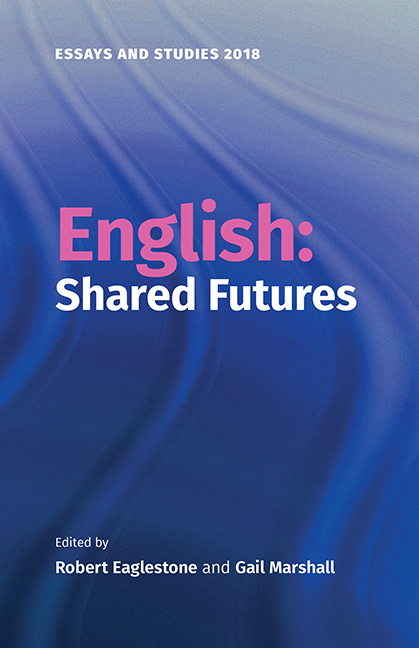Book contents
- Frontmatter
- Contents
- Notes on Contributors
- Acknowledgements
- Abbreviations
- Introduction
- The Changing Picture of School English
- From A-Level to HE: Working Towards a Shared Future?
- English Outreach: Academics in the Classroom
- From Provider to Stager: The Future of Teaching English in HE
- Pedagogic Criticism: An Introduction
- Exquisite Tensions – Narrating the BAME ECA Experience
- Postgraduate Futures: Voices and Views
- Shared Futures: Early Career Academics in English Studies
- Some Reflections on the Funding of English Departments
- English: The Future of Publishing
- Digital Futures
- A View from the United States: The Crisis in the Humanities; the Liberal Arts; and English in the Military Academy
- The Future of Borders
- ‘Between and Across Languages’: Writing in Scotland and Wales
- Exploring Intersections between Creative and Critical Writing: An Interview with Elleke Boehmer
- Integrating English
- Employability in English Studies
- Creative Living: How Creative Writing Courses Help to Prepare for Life-long Careers
- Practice at Large: How Creative Writing can Enhance University Research Environments
- ‘And who can turn away?’ Witnessing a Shared Dystopia
- English and the Public Good
- ‘Can Wisdom be put in a silver rod? / Or Love in a golden bowl?’ On Not Defending the Humanities
- ‘Something Real to Carry Home When Day Is Done’: The Reader in Future
- Afterword
- Index
‘Between and Across Languages’: Writing in Scotland and Wales
Published online by Cambridge University Press: 15 October 2019
- Frontmatter
- Contents
- Notes on Contributors
- Acknowledgements
- Abbreviations
- Introduction
- The Changing Picture of School English
- From A-Level to HE: Working Towards a Shared Future?
- English Outreach: Academics in the Classroom
- From Provider to Stager: The Future of Teaching English in HE
- Pedagogic Criticism: An Introduction
- Exquisite Tensions – Narrating the BAME ECA Experience
- Postgraduate Futures: Voices and Views
- Shared Futures: Early Career Academics in English Studies
- Some Reflections on the Funding of English Departments
- English: The Future of Publishing
- Digital Futures
- A View from the United States: The Crisis in the Humanities; the Liberal Arts; and English in the Military Academy
- The Future of Borders
- ‘Between and Across Languages’: Writing in Scotland and Wales
- Exploring Intersections between Creative and Critical Writing: An Interview with Elleke Boehmer
- Integrating English
- Employability in English Studies
- Creative Living: How Creative Writing Courses Help to Prepare for Life-long Careers
- Practice at Large: How Creative Writing can Enhance University Research Environments
- ‘And who can turn away?’ Witnessing a Shared Dystopia
- English and the Public Good
- ‘Can Wisdom be put in a silver rod? / Or Love in a golden bowl?’ On Not Defending the Humanities
- ‘Something Real to Carry Home When Day Is Done’: The Reader in Future
- Afterword
- Index
Summary
Robert Crawford writes that in Scotland we live ‘between and across languages’. In doing so he draws attention to the fact that Scotland is, and has long been, a multilingual nation where English, Scots and Gaelic are both spoken and literary languages, and where many people slide between these languages in their daily lives. This multilingualism is something that Scotland shares with Wales, where a fifth of the population speak Welsh and there is a vibrant Welsh-language literary culture. This essay will explore how such diversity has manifested itself in different (and similar) ways in Anglophone literature from Scotland and Wales, and how this potentially opens up a space to consider what writing in ‘English’ may mean today.
The histories of the two Celtic languages of Scotland and Wales are rather different. The decline of Gaelic and its near eradication in the wake of the defeat of Jacobitism in 1746 and in the light of mass emigration from the Highlands in the eighteenth and nineteenth centuries has been well documented. Welsh remained the majority language (though with no institutional status) until the late nineteenth century, when a combination of economic, educational and cultural pressures ensured a rapid decline, which was halted only by concerted activism and political change in the second half of the twentieth century. While the pressures on both language communities remain intense, writing in Gaelic, as in Welsh, continues to develop and evolve in creative ways. In Wales it is the (sometimes uneasy) coexistence of Welsh and English that contributes to the linguistic hybridity of Welsh writing in English. In Scotland, the influence of Gaelic on English-language literature, including recent Anglophone fiction by Gaelic writers such as Alasdair Campbell (Alasdair Caimbeul), shares some of the features of Anglophone Welsh literature. In the wider Scottish, context, however, what is perhaps more immediately pertinent to a discussion of linguistic hybridity is the presence of Scots as a language and its persistence in both spoken and literary forms.
Scots was historically the language of both court and law in Scotland, but the departure of the court in 1603 had a severe effect on its status. The introduction of the King James Bible in 1611 and the Union of the Parliaments in 1707 placed it under further pressure.
- Type
- Chapter
- Information
- English: Shared Futures , pp. 126 - 135Publisher: Boydell & BrewerPrint publication year: 2018

